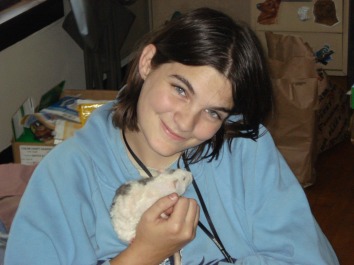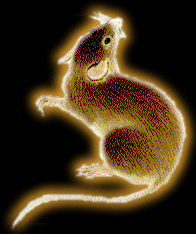Welcome to Rachel's Ratties!!!!!
The Story: How We Began Our Rats

Once upon a time, a 21 year old woman named "Rachel" had found a job at Northern Labs. After a few months of working there, she eventually meets a gothic-dressed girl named "Amanda," and on the second week of talking to her during work, "Amanda" asks for her to come over to her house after work.
Upon entering her house that day, "Rachel" had seen a sight that she couldn't believe that she had seen. Within about 3 or 4 different cages, there were about a dozen rats residing within them. Many colors were seen, and at first, "Rachel" wasn't sure if petting them were safe, or not.
After a few minutes of supervised rat play, "Rachel" decided that she would talk her husband for one. Little did she know, "Amanda" wanted to get rid of some of her own. Upon asking "Rachel" about one particular rat, a Variegated, Curly rat named "Moo," "Rachel" decided to take it home, for two reasons, this time.
"Moo" reminded her of a rat that looked just like him, back in 2003. "Rachel" had a friend named, "Amy," and she was trying to get rid of a curly, spotted rat back then. This rat acted like he remembered "Rachel," but what chances would that be?
Within weeks of still hanging out with "Amanda," "Rachel" did the unbelieveable, and took home a female, aguoti, standard/dumbo mix they named "String Cheese." Deciding that naming a rat after food was something she just wouldn't do, I named her "Hinata," after the girl from the Naruto cartoon series, which, in Japanese, means "shy sunshine," just like the eyes to her soul had revealed to me. Besides, she responded to "Hinata" much faster than to "String Cheese." Why? It's a question the owner still ponders.
A month had passed, and "Rachel" awoke one morning, to the sight of not two rats, but two adult rats, and a litter of Rittens! There were 2 girls and 7 boys, and 4 of them had been chosen to stay for "Moo's" company. Why "Moo" first, you ask?
"Moo" was never the same, after his two buddies had left his life. Upon seeing the babies, he was immediately a joyful rat, once more, particularly the ritten we named, "Shadow," after Shadow the Hedgehog. These two became fast friends, picking on each other constantly in a playful manner, everytime they come out to play.
"Shadow" liked "Jeffy," as well, as they played tag as rittens, and then playing like "Moo" does. "Sam" and "Frodo" were fancied by "Rachel's" husband, "Chad," and 2 became 6.
"Hinata," however, was lonely. Here, she sees all of these boys, and she's all alone. "Rachel" had a guinea pig, as well, and she attempted to befriend the rat and the piggy for "Hinata's" company, but that guinea pig was a mean monster to her. Upon feeling the loneliness and envy upon her female rat's mind, "Rachel" decided to take her to the pet store to choose herself a companion.
Many little rats were afraid of her whence she came into the pen of babies, but "Hinata" became very interested in two of them. The first one, however, was a male, so that was automatically declined to her biddings. The second was a gray-brown, hooded female named "Rin," which means "Companion," according to the naming list of Inuyasha's names and meanings.
The name fit this girl perfectly. If she didn't have a friend in her home with her, "Rin" was a very, lonely rat, far more lonely than "Hinata" had shown before she made her home with the Jaskolski's. After a lot of tests to ensure her health, the two were finally able to live together.
However, "Rachel" still wanted a female descendent from her first curly rat. By breeding "Moo" to "Hinata," she created a small litter of 7. Although there was only 1 female, she proved to her new owner that being the only one brings great pleasures--that is, BEFORE her mother had taught her how to clean our teeth as soon as she was old enough to fend for herself.
She earned the name "Athena," named after Hercules's "mother" in the Disney movie. Upon looking up information about this name, "Rachel" has learned that "Athena" meant beauty and wisdom, and boy, did she have that!
Litters came and gone through hard work and determinations based on the intelligence of the Jaskolski's rats, and yet, the only time they planned a breeding was when enough people asked about creating some. Slowly, the Jaskolski's rats became known, especially at the Mad Hatter, where 3 rats from "Rin" and "Moo" are now being trained to get better props to their family in which they were born from. From this same litter, "Runt" was born, as well.
"Runt" grew with her friendliness more toward "Chad," but she runs back and forth to each owner for equal attention. Intelligence is even higher than that of "Athena," although, the Jaskolski's don't like to rate intelligence too much when it came to the pets of the house.
And so, the story of our lives with rats began. Health and freedom from cancer are very important when it comes to breeding rats, this I truely understand, but where's the intelligence, where they learn tricks fast, or the assurance of their ways around other animals, like dogs, cats, or guinea pigs? Is this not important, as well? I breed for all 4 of these traits.
Actions are what send those to buy a rat, NOT a name. Remember this, and you WILL, eventually, become a good rat breeder. It takes a lot of hard work and dedication, but I'm willing to do that, and still keep the names mentioned throughout the years of adopting new pet rats.
I put PET RATS up for adoption, NOT SHOW RATS, at least, NOT YET. When the day comes, they'll be known as PET SHOW RATS. For now, courage, and IGNORANCES TO THOSE AGAINST HOW I AM BREEDING.
We hope our story touched you into better-understanding our rats, and we hope to hear more about those interested in adopting when their popularity grows again. For now, this is a website showing people about rats, showing them our rats and their photos/videos, and teaching care/showing of rats. May the days grow better soon! :D
Fixing a Rat???
Let's say you have a young, male rat that has just grown up enough to breed, but his reputation turned from friendly to rude and "nippy." You've taken him to the vet more than three times, to ensure that it wasn't a sign of any common illnesses that rats could get. You've tried every possible solution to any emotional problems, and probably started spoiling him rotten over tablescraps, another buddy, extra toys, and even constantly changing the cage around to prevent him from going nuts. There's only one possible action left, but is it worth fixing a rat to keep him happy?
Ask yourself this: Is it worth being unhappy until the day you die? I strongly believe that if someone had absolutely tried EVERYTHING to keep their pet happy, it would be best if the rat had been fixed. Many pets have changed from mean to extra-friendly after their owners had either spayed or fixed them. Why?
I'm not sure what scientists say about this, but I have a strong feeling that some pets could end up with a situation where there may be too much estrogen or testosterone within the pet's system, which causes the pet to stress out easily and cause countless problems toward their owners, as well as their buddies, and so by getting rid of the estrogen or the testosterone causing the situation, the pets become less stress.
Rats and Infants???
Are you having a baby, but you're a strict rat lover that just CANNOT avoid the attention you give them, but you're not sure if infants should be around them? Have I got news for you! THERE IS A SOLUTION!!
Upon your baby's birth, keep him/her hands/feet/face, or any other open-skinned areas, in order to prevent any food smells from making him "kiss" or "nip," CLEAN before you allow "Butters" to romp around and meet your new family member, and after that, even. Avoid him from going near your infant's face, and all should be alright.
If you keep your infant interacting with rats throught his/her whole year of growing fast, he/she will learn to stay friendly with "Butters." By the time your child turns 2 years old, you won't have to worry about him/her being "rough" with him. By then, your child will learn about becoming "bitten," which will show him/her that he/she's being too rough with the rodent, and in the end, he/she learns to be more gentle with them.
So next time you have visitors over, and your two year old has the rats out to play with him/her, and someone asks if you worry about him/her being too rough, smile a great, big, confident smile and gladly say, "no." Explain this, and it will amaze many mothers, as well as many rat owners.
An Introduction to the NEW J.R.F.P.R. Forms!
What's So Special About These "Forms?"

J.R.F.P.R. stands for Jaskolski's Registration of Family Pet Rats. It's a toll-free, show-less family of rats, all bred exclusively for PET purposes. There is no need for specific color, breed, marking(s), or family history, unless it is well-known by the owner (In this case, you will know where your rat will come from).
The Way of Registration: Questions You May Be Pondering
How Can I Register My Pet Rat For A Full Name?
Pet rats are everywhere, but we generally take pride in our pets' personalities. The only way you'll be able to register a pet rat to a full name (none of these files are legal, just fun forms for our records of where our adopted goes.), is if you adopt a rat from our family (NOT the rats you see in the J.R.F.P.R forms tab, as those are already adopted and owned by adoptees.), and decide whether or not if you would like to do so.
What Characteristics Do You Breed For?
We specifically breed for people who want a pet rat with the best POSSIBLE intellect for training purposes, as well as good agility for maze speed purposes, as many rats find that homemade mazes are actually fun, with a special treat waiting for them at the end of the line. We also breed for their overall manners toward other pets, like cats or guinea pigs. There is NEVER any intentions for specific breeds, only specific intellect.
I Adopted One Of Your Family Rats, and you, as their first owners, have already registered and named them. I plan to change the name to one more suitable for me, but is it too late to change the registered name(s) you've chosen to my choice?
NO. What full name you choose is up to you. I just like to somewhat keep their names together, in order for adopters to see their mother and father's full names. As soon as you adopt a rat, you can change the registered name to whatever you please, as it is mainly used to identify the rat's birthdate, mix in breeds, color markings, parent's names, their nature of intellect, and many more things listed within the forms.
Can I Show My Pet Rat?
Showing your rat isn't against the rules, but don't expect a curly-looking rat to be a full rex, as they would only be half-breed of a rex. Our rats either become curly/standard, curly/dumbo (very rare, as Hinata and the 4 boys are 1/2 dumbo, due to Hinata's daddy...), or standard/dumbo. It may not be 1/2 and 1/2, but no matter what, there will always be a little of another thing in them.
Don't expect a breeder to come and expect all babies to come out as the breed you've chosen to be exact with the other's breed. Our rats just are not fit for purebred purposes.
Make sure also, that your rat has a tail that touches all the way to the tip of the nose, and also that they have a well-structured head and body, in order to even qualify for good points in the show. I would suggest only applying for pet rat classes, as purebred classes may automatically disqualify them.
How Much Do You Charge For Your Adoptable Rats?
Price is only spoken through a sent email message of interest to: [email protected] . Send us your name, area in which you live, and the rat's(') name(s) that you are interested in. Price depends on location and travel costs that could stress out your new pet(s).
How Can I Ensure That Our Chosen Pet Rat Is Part Of The Jaskolski Family, And Not A Pet Store's, Or A Rescue's?
Upon the time to mate one of our males with one of our females, ensuring that no family will interbreed in factors like sister and brother, or mother and son, half siblings thorough the parents' genetics, or father and daughter, BUT allowing breeding of half-family member by a different litter with a half-related from another, we take photos of which males and which females are together.
Upon the birth, we take photos from birth on of the group of the litter of rittens with the mother, and then, when old enough, with the father, for you to compare for yourself. We ensure that at certain days old, with the markings availiable, the adopter can clearly see that the rat with them is the parent.
We do not purchase our rats from a pet store or a rescue. We started our family out with two rats from a separate family, yet with records, excluding Rin, as we needed an extra female. She is the only one who was purchased from a pet store or a rescue.
How Can We Ensure That They're Cancer-Free, or Preventable Of Diseases?
Though rats are generally clean critters, cancer is, in fact, a bad genetic that many people are trying to prevent from growing into the little ones. However, the only way that they can SEE if the genetics are THERE are scientists, or, growing old on their own. 3 yr. old Moo STILL has no cancer, but we are still ensuring if his cancer-less genetics are working on his offspring, as the Hinata and Rin, now getting to the age where birth is to no longer happen for them, is still under strict observation as Runt and Athena grow up to begin their own, cancer-less observations (as both are Moo's daughters, but Runt is Rin's, and Athena is Hinata's.
We also need to keep watch on Hinata's first litter's boys, as we no longer know the result of their father, grandfathers, or grandmothers. They no longer contact us, and so we don't know if they'll be affected, or not. But, before they are 2, we plan to breed one of them to Runt, keep in contact with a male adopter from one of her babies, and then breed Athena to the male for relative results and inspection. In hopes of constantly investigating these litters, regardless of how many we end up keeping from these litters, we hope to rid the genetics of cancer through investigating and experiment. Until further notice, we cannot ensure whether cancer is, or is not, in their blood, but we DO hope to catch any rat with it, and then try our best to cancel it out, for a prolonged life for our families.

